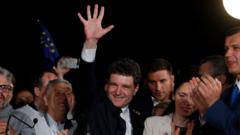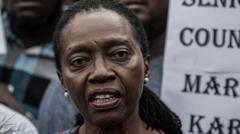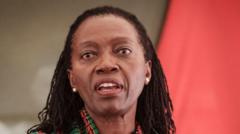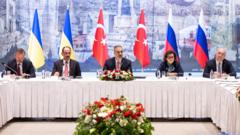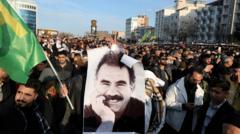In a politically charged climate following a student-led revolution last year, Muhammad Yunus finds himself grappling with mounting pressure from political parties and the military over the pace of impending elections. Appointed as the leader of an interim government to stabilize the situation, Yunus now threatens to resign if he doesn’t receive necessary support, leaving many to question the future of governance in Bangladesh.
Bangladesh's Interim Leader Faces Resignation Threat Over Election Delays

Bangladesh's Interim Leader Faces Resignation Threat Over Election Delays
Muhammad Yunus, Nobel laureate and head of Bangladesh's interim government, warns of resignation amid political pressure to hasten elections.
As Bangladesh approaches the nine-month mark since the ousting of Sheikh Hasina's government, fresh tensions have emerged. Yunus’s appointment was hailed as a beacon of hope for restoring democratic order, yet the interim government has faced criticism for not moving rapidly enough toward new elections. Key political players, including the army and the largest political party, are pressuring Yunus for a swift electoral process, arguing that delays undermine public trust.
Insiders reveal that recent public statements from military leaders escalating calls for elections have aggravated Yunus, who is struggling to implement his policies amid this confluence of pressures. On Thursday, he took a decisive stand by drafting a resignation speech, citing frustration over obstructive political maneuvers aimed at hastening elections. However, strategic advice from his aides persuaded him to reconsider this drastic step, fearing that it could further destabilize an already fragile political landscape.
Yunus's leadership and the interim government now sit on a precarious edge, with the delicate balance of military influence and political maneuvering pushing the country toward critical crossroads, forcing all eyes on the future direction of Bangladesh's democracy.
Insiders reveal that recent public statements from military leaders escalating calls for elections have aggravated Yunus, who is struggling to implement his policies amid this confluence of pressures. On Thursday, he took a decisive stand by drafting a resignation speech, citing frustration over obstructive political maneuvers aimed at hastening elections. However, strategic advice from his aides persuaded him to reconsider this drastic step, fearing that it could further destabilize an already fragile political landscape.
Yunus's leadership and the interim government now sit on a precarious edge, with the delicate balance of military influence and political maneuvering pushing the country toward critical crossroads, forcing all eyes on the future direction of Bangladesh's democracy.

